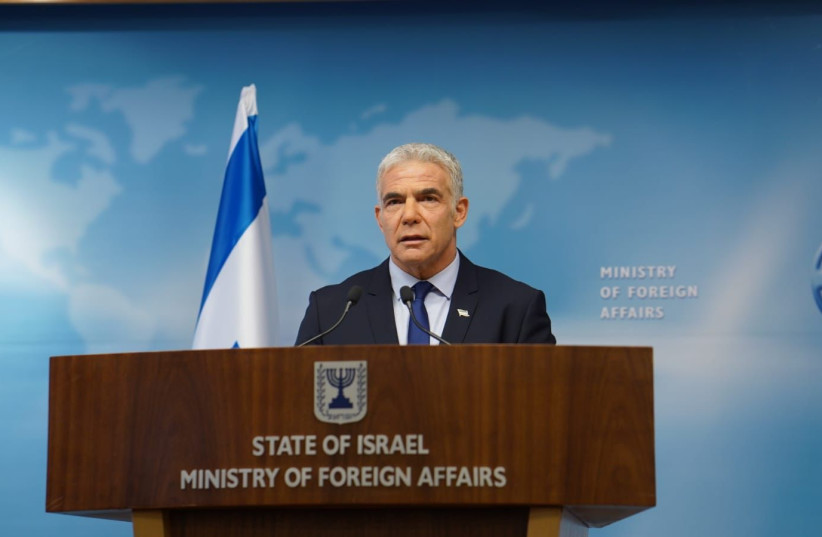On Friday, Israeli Ambassador to Russia Alex Ben-Tzvi was summoned to the offices of Russia's Foreign Ministry in Moscow where he was reprimanded for Foreign Minister Yair Lapid's condemnation of the invasion of Ukraine a day earlier.
In a meeting with Mikhail Bogdanov, the Deputy Foreign Minister and special representative of the president of Russia to the Middle East, Ben-Tzvi was asked why Israel "supports neo-nazis,” a reference to Ukraine.
While the reprimand and its consequences will need to be analyzed in the days to come, the truth is that Israel did all it could to avoid condemning Russia.
On Wednesday, a day before the invasion, the Foreign Ministry put out a statement declaring its support for Ukraine’s territorial integrity and independence without mentioning Russia.
The next day, after the Russian invasion had begun, Israel increased the volume. “The Russian attack on Ukraine is a serious violation of the international order,” Lapid said in a televised address. “Israel condemns the attack, and is ready and prepared to provide humanitarian assistance to the citizens of Ukraine.”

The fact that it was Lapid who spoke and not Prime Minister Naftali Bennett showed Israel’s delicate management of this situation. So far, it is only Lapid criticizing Russia. When Bennett speaks it is far more neutral.
Two senior government sources told The Jerusalem Post’s Lahav Harkov that Lapid and Bennett’s messages – and the differences between them – were coordinated and meant to be complementary.
The reason is simple. Unlike the United States, the United Kingdom or even France, Israel is neighbors today with Russia. Vladimir Putin controls Syria and has the power to decide if Israeli military strikes against Iranian targets in the country can or cannot continue. If Israel overly criticizes Russia, Putin might just decide to do that.
It is for that reason that Israel is being careful and is watching it’s rhetoric. It is essentially a dilemma between Israeli values and Israeli national security interests.
On the value side is the need to take a stand against Putin and the Russian invasion of Ukraine. Israel is a liberal democracy and is obviously opposed to Russian aggression meant to reshape the world order. There is also the United States and the Biden administration which is leading the international efforts against Russia, so far without success.
On the other hand are Israeli security interests in Syria where Iran has tried in recent years to build up infrastructure like it has in Lebanon to use to threaten the State of Israel.
Israel would obviously prefer to be able to take a clear and unequivocal stand with the US and Western Europe. That is where it’s values are to be found. On the other hand, it cannot ignore the need to continue getting along with Putin.
As Lapid told the Conference of Presidents of Major American Jewish Organizations last week, Israel is to some extent like a Baltic state. It might be opposed to Russian action, but because Russia is its neighbor, it needs to tread carefully.
This is not a simple situation to manage for any government, let alone one whose key ministers - prime minister and foreign minister - are relatively new in their positions. Already, relations with the US are strained over the continued march toward a weaker and shorter nuclear deal with Iran. The ongoing conflict in Ukraine will not help alleviate the tension.
On the other hand, as the invasion of Ukraine continues, the death toll rises and additional Russian moves become clear, Israel will not be able to stand for long on the sidelines. It will feel pressure to take a stronger and harsher moral stand on the conflict despite the price it might pay in Syria.
So far, Israel is managing this situation responsibly, doing what it can to straddle a delicate balancing act between standing for values in the West while guaranteeing its own security interests.
In the long term that might not be possible. Israel needs to prepare for when that hard decision will need to be made and it will need to stand with what is morally right even if there will be an inconvenient price to pay.
